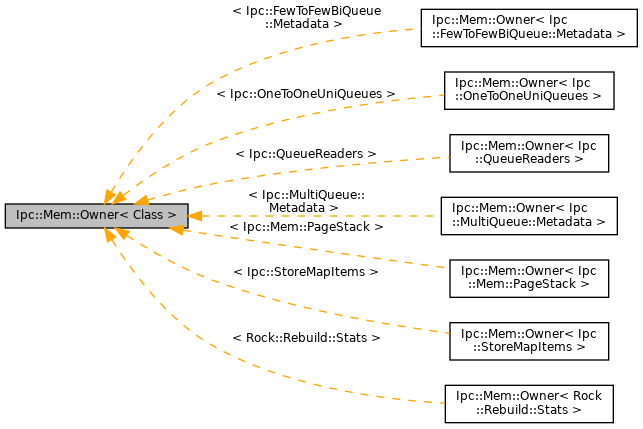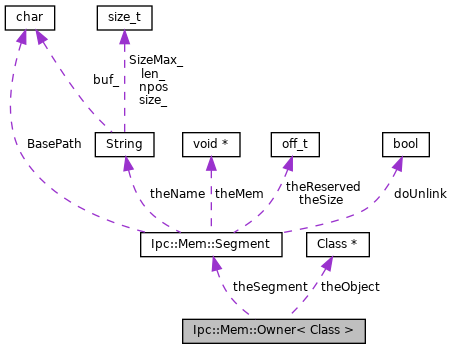#include <Pointer.h>


Public Member Functions | |
| ~Owner () | |
| Class * | object () |
| Raw access; handy to finalize initiatization, but avoid if possible. More... | |
| template<class P1 > | |
| Owner< Class > * | New (const char *const id, const P1 &p1) |
| template<class P1 , class P2 > | |
| Owner< Class > * | New (const char *const id, const P1 &p1, const P2 &p2) |
| template<class P1 , class P2 , class P3 > | |
| Owner< Class > * | New (const char *const id, const P1 &p1, const P2 &p2, const P3 &p3) |
| template<class P1 , class P2 , class P3 , class P4 > | |
| Owner< Class > * | New (const char *const id, const P1 &p1, const P2 &p2, const P3 &p3, const P4 &p4) |
Static Public Member Functions | |
| static Owner * | New (const char *const id) |
| template<class P1 > | |
| static Owner * | New (const char *const id, const P1 &p1) |
| template<class P1 , class P2 > | |
| static Owner * | New (const char *const id, const P1 &p1, const P2 &p2) |
| template<class P1 , class P2 , class P3 > | |
| static Owner * | New (const char *const id, const P1 &p1, const P2 &p2, const P3 &p3) |
| template<class P1 , class P2 , class P3 , class P4 > | |
| static Owner * | New (const char *const id, const P1 &p1, const P2 &p2, const P3 &p3, const P4 &p4) |
| static Owner * | Old (const char *const id) |
| attaches to the existing shared memory segment, becoming its owner More... | |
Private Member Functions | |
| Owner (const char *const id) | |
| Owner (const char *const id, const off_t sharedSize) | |
| Owner (const Owner &) | |
| Owner & | operator= (const Owner &) |
Private Attributes | |
| Segment | theSegment |
| shared memory segment that holds the object More... | |
| Class * | theObject |
| shared object More... | |
Detailed Description
template<class Class>
class Ipc::Mem::Owner< Class >
allocates/deallocates shared memory; creates and later destroys a Class object using that memory
Constructor & Destructor Documentation
◆ ~Owner()
| Ipc::Mem::Owner< Class >::~Owner |
◆ Owner() [1/3]
|
explicitprivate |
◆ Owner() [2/3]
|
private |
◆ Owner() [3/3]
|
private |
Member Function Documentation
◆ New() [1/9]
|
static |
◆ New() [2/9]
|
static |
◆ New() [3/9]
| Owner<Class>* Ipc::Mem::Owner< Class >::New | ( | const char *const | id, |
| const P1 & | p1 | ||
| ) |
◆ New() [4/9]
|
static |
◆ New() [5/9]
| Owner<Class>* Ipc::Mem::Owner< Class >::New | ( | const char *const | id, |
| const P1 & | p1, | ||
| const P2 & | p2 | ||
| ) |
◆ New() [6/9]
|
static |
◆ New() [7/9]
| Owner<Class>* Ipc::Mem::Owner< Class >::New | ( | const char *const | id, |
| const P1 & | p1, | ||
| const P2 & | p2, | ||
| const P3 & | p3 | ||
| ) |
◆ New() [8/9]
|
static |
◆ New() [9/9]
| Owner<Class>* Ipc::Mem::Owner< Class >::New | ( | const char *const | id, |
| const P1 & | p1, | ||
| const P2 & | p2, | ||
| const P3 & | p3, | ||
| const P4 & | p4 | ||
| ) |
◆ object()
|
inline |
Definition at line 43 of file Pointer.h.
Referenced by Rock::LoadingParts::flags(), Rock::LoadingParts::mores(), Rock::LoadingParts::sizes(), and Rock::LoadingParts::versions().
◆ Old()
|
static |
Definition at line 123 of file Pointer.h.
Referenced by createOwner().
◆ operator=()
|
private |
Member Data Documentation
◆ theObject
|
private |
Definition at line 54 of file Pointer.h.
Referenced by Ipc::Mem::Owner< Ipc::OneToOneUniQueues >::New(), and Ipc::Mem::Owner< Ipc::OneToOneUniQueues >::object().
◆ theSegment
|
private |
Definition at line 53 of file Pointer.h.
Referenced by Ipc::Mem::Owner< Ipc::OneToOneUniQueues >::New().
The documentation for this class was generated from the following file:
- src/ipc/mem/Pointer.h
Introduction
- About Squid
- Why Squid?
- Squid Developers
- How to Donate
- How to Help Out
- Getting Squid
- Squid Source Packages
- Squid Deployment Case-Studies
- Squid Software Foundation
Documentation
- Quick Setup
- Configuration:
- FAQ and Wiki
- Guide Books:
- Non-English
- More...
Support
- Security Advisories
- Bugzilla Database
- Mailing lists
- Contacting us
- Commercial services
- Project Sponsors
- Squid-based products
